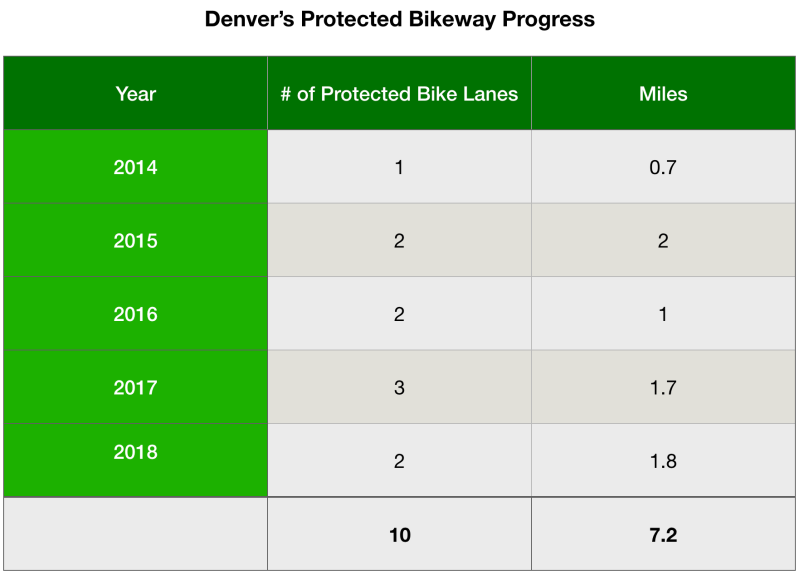Hancock’s Not Picking Up the Pace on Protected Bike Lanes This Year
Denverites are being told to wait til next year. Again.

Since Denver first started to build out protected bike lanes, the pace of progress has been slow — too slow to build out a full network of safe, all-ages bikeways in our lifetimes.
Don’t expect anything to change in 2018.
There are only two new on-street protected bike lanes on the docket this construction season. One is already done: The very short, curb-protected lane on 19th Avenue. The other is the raised bikeway along the soon-to-be reconstructed Brighton Boulevard.
Those are good projects, but it’s just 1.8 miles of protected bikeways — basically the same as last year.
All of Mayor Hancock’s promises about expanding cycling options citywide feel pretty hollow when this is Denver’s annual output of protected bike lanes. Hancock says he wants biking and walking to combine for 15 percent of trips by 2020. They combined for just 6.8 percent in 2017 [PDF].
Protected bike lanes aren’t the only way to increase ridership, but they’re an essential one. As active transportation evangelist Gil Peñalosa told Hancock in 2016, when people of any age can feel safe making all of their daily trips on a well-connected bike network, that unlocks bicycling as a mass mode of travel.
Since 2014 Denver has added just 6.1 miles of protected bikeways. Minneapolis has more than doubled that total in the same amount of time, according to a tally from People for Bikes. New York has beaten it by a factor of 11.
Hancock did not increase funding for bike lanes in this year’s budget. But voters did approve his bond initiative, including $18 million over 10 years for protected lanes, and Hancock has allocated resources for more transportation staffers to plan, design, and build them.
Despite those moves, DPW has fewer people working on bike network expansion than last year. The city no longer has an urban mobility manager. Emily Snyder, who held that position, moved to the city’s budget office. Another senior bike and pedestrian planner left earlier this year and has not been replaced.
Maybe things will get better as DPW Executive Director Eulois Cleckley reorganizes the department to elevate transportation. He’s working on being “more strategic to deliver the projects at a quicker pace,” Cleckley said last month.
According to DPW, the pace of new bikeways will accelerate, just not yet. “In fact, we’re already planning for 2019 and expect to ramp up our implementation of bike projects, as our annual work program runs in parallel with projects programmed in the new bond initiative,” DPW spokesperson Nancy Kuhn said in an email.
But in 2018, Denverites are being told to wait til next year. Again.


